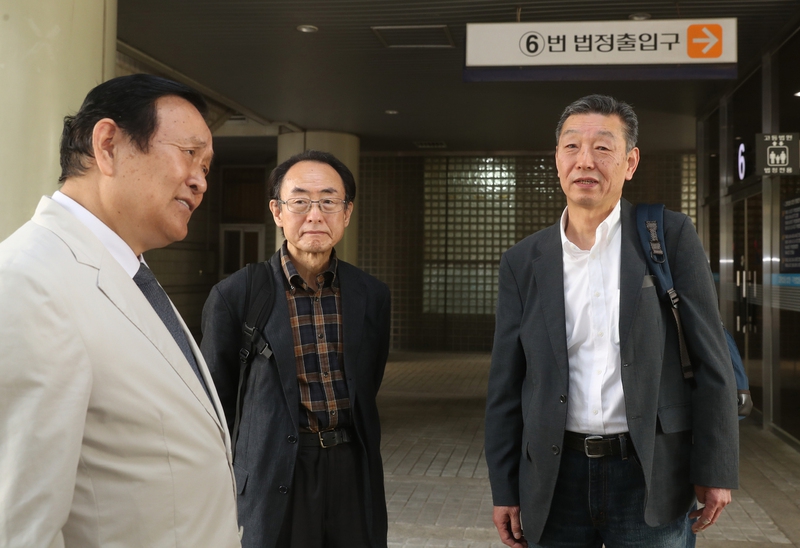 |
|
Yun Jeong-heon (right), a Korean-Japanese who was framed as a spy and tortured by former anticommunist investigator Koh Byeong-cheon, speaks with other victims of torture Kim Won-jung (center) and Kang Jong-geon (left) in front of Seoul Central District Court after a retrial in which Koh was sentenced for perjury. (Kang Jae-hoon, staff photographer)
|
Koh Byeong-cheon gave false testimony in retrial of torture victim framed as a spy
An investigator who gave false testimony in the retrial of a torture victim, claiming that no torture had occurred, has been sentenced to one year in prison. On May 28, Hon. Lee Seong-eun, a judge in the 19th criminal division of the Seoul Central District Court, sentenced Koh Byeong-cheon, 82, to one year in prison. Koh was on trial for perjury. “The defendant’s false testimony kept the truth from coming to light and impeded the function of the judiciary. The only possible interpretation is that this [false testimony] was intended to sweep human rights violations under the rug,” Lee said as he explained his sentence. On Dec. 16, 2010, Koh appeared as a witness in the retrial of Yun Jeong-heon, 65, a Korean-Japanese who had been framed as a spy, and falsely testified that no torture had occurred. This led to his indictment on the charge of perjury in Dec. 2017. Koh, an investigator with the anticommunist department of the South Korean army’s Defense Security Command, cruelly treated people including Yun in 1984 and Lee Jong-su in 1982. After detaining these individuals, Koh would torture them by forcing them to sit a metal chair and then either beating them with a truncheon or dropping them into a basement in what was called the “elevator torture.” Koh had asked the court for leniency. “It was an unusual time in society when national security was the top priority, and cruel behavior and other illegal types of interrogation were standard practice at government agencies in charge of anticommunist investigation. Personal ambition was not the motivation behind this cruel behavior, and my concern that telling the truth might sully the reputation of the institution, my colleagues and the nation left me with no choice but to give false testimony,” he said. “The national security situation at the time and standard practice in anticommunist investigations are no excuse for torture and other cruel behaviors. The defendant was given credit for his detention and investigation of spies with a reward and a promotion to the rank above section chief. The defendant is not telling the truth when he claims he was not pursuing personal advancement and that instructions from his superiors compelled him to take part in torture,” the judge said. “The defendant subjected the victim to the kind of barbaric pain and harm that will continue to affect the victim for the rest of his life, and there is no way that this can be justified as standard practice. It is dubious whether the defendant could sustain this position if his family members had been tortured, too,” the judge said. “The defendant says that his family members are asking for lenience, but it is unclear whether it is appropriate for the defendant to make such a claim considering that he did not bother to think that the torture victims might have families waiting for them, too, when he was committing severe human rights violations against their bodies and their lives,” the judge added. “If [Koh] had confessed, he could have been sentenced to prison between January and October, but I will give him a prison term that exceeds the sentencing guidelines,” the judge said, as he sentenced Koh to one year in prison. “This comes as a relief. Since the prosecutors only asked the judge for a sentence of one year, I was concerned that Koh might get a suspended sentence,” Yun Jeong-heon told reporters after watching the sentencing. “One year will soon be over, but there are least fifty people who suffered because of that man. [His sentence] ought to have been fifty years.” Victims don’t get “lost time back” “Sending that man to prison doesn’t mean that his victims get their lost time back. The investigating authorities need to treat this as an opportunity to gain a new appreciation for human rights,” said Lee Jong-su, 60. Other victims of torture who watched the sentencing also welcomed the court’s ruling. “Seeing the court strictly punish the torturer makes me think that justice is alive in the judiciary. Thanks to the court’s ruling, the bitterness in my heart seems to be melting” said Kim Tae-ryong, 69, who was tortured during the investigation of a spy ring in Samcheok. “It was such a relief to see the court rebutting the torturer’s claims one by one. This makes me think that [the judiciary] won’t lose any more ground,” said Na Jong-in, 80, who was tortured and framed as a spy by the Defense Security Command in 1984. By Ko Han-sol, staff reporter Please direct comments or questions to [english@hani.co.kr]






